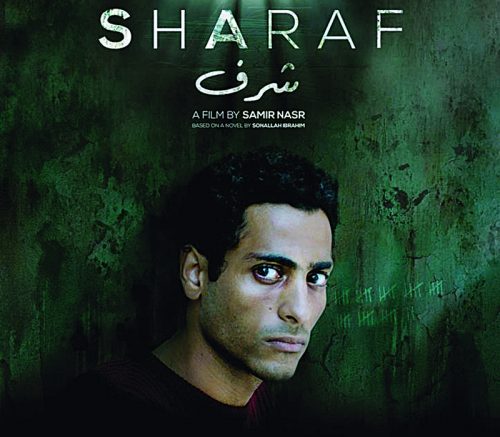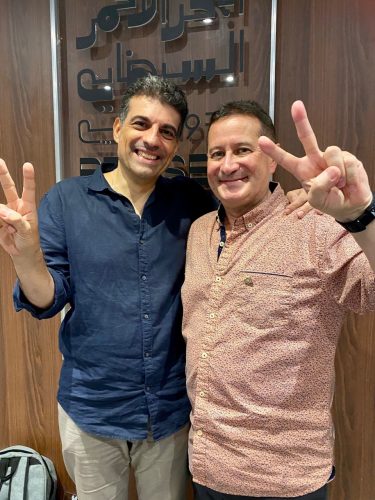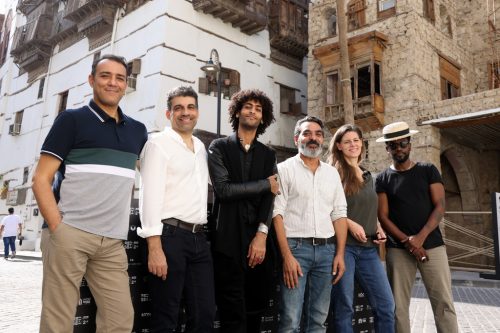Interview with Director: Samir Nasr
SHARAF is an amazing tour de force by maverick director Samir Nasr. It explores with a visceral attitude the dystopian prison world in the Arab world. This was one more breathtaking film to watch during the Red Sea International Film Festival. After the premiere, we met with Samir to explore his vision and the impact of his intense movie.
Q: Why this film and what were the themes of importance for you?
Samir: The inspiration was the novel that inspired this film. It was written by Sonallah Ibrahim who is an amazing Egyptian writer. I read this novel when it came out in 1997 and I thought it was an amazing description of the Egyptian society. It’s so full of truth because it mirrors the whole society in the prison system. I thought someone was going to turn it into a movie but, years, later it still wasn’t the case. This novel kept haunting me. As I always say: I didn’t choose this novel, this novel chose me! It’s like falling in love, you can’t resist the spell put upon you. Sonallah wanted to know why I wanted to adapt his novel and I explained that this wasn’t just another prison movie but that it was more about the society outside the prison universe.
Q: Tell me about the various challenges you faced to bring it to the screen?
Samir: It’s a very challenging movie because it’s about Egyptian society and the prison system. For years we thought we could finance it with Egyptian producers and Egyptian funding but it didn’t happen. People were afraid about this film and they thought it couldn’t be successful. So, we went after an international collaboration bringing on board a French and a German producer. And another one from Tunisia. It was going to be an Egyptian film but we, at the end, didn’t pass the censorship. We changed the approach. We had at that time, in 2019, the Arab spring. So, we decided to turn it into a wider story and about the Arab world, about the prison. We took out from the script the Egyptian context. And suddenly we decided to have various Arab actors from different countries. My main actor was found in Tunisia just a few days before the beginning of the shooting. We assembled the final cast just two weeks before the filming of ‘Sharaf’. It’s really a movie that exposes corruption and manipulation of the truth. It was a quite a challenge. And, of course, it’s challenging when you have a tight schedule and a small budget. But I’m proud of our film, we did it!
Q: What are your expectations with a film like this and to be here at the Red Sea Film Festival?
Samir: We were so surprised and so happy that the Red Sea Film Festival reached out to us and invited us here. They really wanted the film. I value this very highly. It will be a heavy debate and the film will probably divide people. But this film is very timely with the opening of the Arab world and the changes happening, little by little. I hope this film will open a dialogue. Cinema is important and it reflects the ideas and the struggle faced by people. I think it’s time to do films that deals with what’s going on. It’s important for me to show what is in the minds and the hearts of the people. I’m looking for whatever feedback we can get, it’s a blessing if we can wake up people and bring them to the conversation table.
Q: What would it take for the Arab world to move forward into a more united and peaceful international scene?
Samir: It will take more and more gathering like the Red Sea film festival where we can all meet and talk and exchange and realize we have more in common than we think. We should unite in a way where we support each other. It needs that we start listening more to each other. We need to accept more each other and engage into a global collaboration, a global partnership. It’s about inclusion and acceptance. We also need to use the huge potential of the young people who have such a global mind, a global thinking. We need to unleash their potential. I really have high hopes that we are finally coming together as one people, one planet. And cinema does help with this process. Time is on our side.
 Teacups & Couture A Fashion Blog by Roxanna Bina
Teacups & Couture A Fashion Blog by Roxanna Bina





